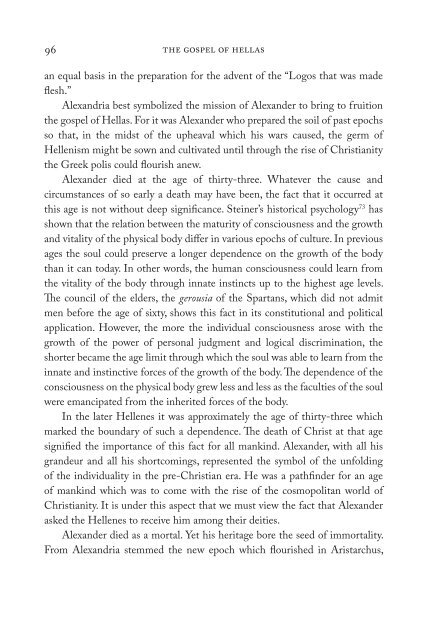The Gospel of Hellas - Research Institute for Waldorf Education
The Gospel of Hellas - Research Institute for Waldorf Education
The Gospel of Hellas - Research Institute for Waldorf Education
You also want an ePaper? Increase the reach of your titles
YUMPU automatically turns print PDFs into web optimized ePapers that Google loves.
the gospel <strong>of</strong> hellas<br />
an equal basis in the preparation <strong>for</strong> the advent <strong>of</strong> the “Logos that was made<br />
flesh.”<br />
Alexandria best symbolized the mission <strong>of</strong> Alexander to bring to fruition<br />
the gospel <strong>of</strong> <strong>Hellas</strong>. For it was Alexander who prepared the soil <strong>of</strong> past epochs<br />
so that, in the midst <strong>of</strong> the upheaval which his wars caused, the germ <strong>of</strong><br />
Hellenism might be sown and cultivated until through the rise <strong>of</strong> Christianity<br />
the Greek polis could flourish anew.<br />
Alexander died at the age <strong>of</strong> thirty-three. Whatever the cause and<br />
circumstances <strong>of</strong> so early a death may have been, the fact that it occurred at<br />
this age is not without deep significance. Steiner’s historical psychology 73 has<br />
shown that the relation between the maturity <strong>of</strong> consciousness and the growth<br />
and vitality <strong>of</strong> the physical body differ in various epochs <strong>of</strong> culture. In previous<br />
ages the soul could preserve a longer dependence on the growth <strong>of</strong> the body<br />
than it can today. In other words, the human consciousness could learn from<br />
the vitality <strong>of</strong> the body through innate instincts up to the highest age levels.<br />
<strong>The</strong> council <strong>of</strong> the elders, the gerousia <strong>of</strong> the Spartans, which did not admit<br />
men be<strong>for</strong>e the age <strong>of</strong> sixty, shows this fact in its constitutional and political<br />
application. However, the more the individual consciousness arose with the<br />
growth <strong>of</strong> the power <strong>of</strong> personal judgment and logical discrimination, the<br />
shorter became the age limit through which the soul was able to learn from the<br />
innate and instinctive <strong>for</strong>ces <strong>of</strong> the growth <strong>of</strong> the body. <strong>The</strong> dependence <strong>of</strong> the<br />
consciousness on the physical body grew less and less as the faculties <strong>of</strong> the soul<br />
were emancipated from the inherited <strong>for</strong>ces <strong>of</strong> the body.<br />
In the later Hellenes it was approximately the age <strong>of</strong> thirty-three which<br />
marked the boundary <strong>of</strong> such a dependence. <strong>The</strong> death <strong>of</strong> Christ at that age<br />
signified the importance <strong>of</strong> this fact <strong>for</strong> all mankind. Alexander, with all his<br />
grandeur and all his shortcomings, represented the symbol <strong>of</strong> the unfolding<br />
<strong>of</strong> the individuality in the pre-Christian era. He was a pathfinder <strong>for</strong> an age<br />
<strong>of</strong> mankind which was to come with the rise <strong>of</strong> the cosmopolitan world <strong>of</strong><br />
Christianity. It is under this aspect that we must view the fact that Alexander<br />
asked the Hellenes to receive him among their deities.<br />
Alexander died as a mortal. Yet his heritage bore the seed <strong>of</strong> immortality.<br />
From Alexandria stemmed the new epoch which flourished in Aristarchus,

















